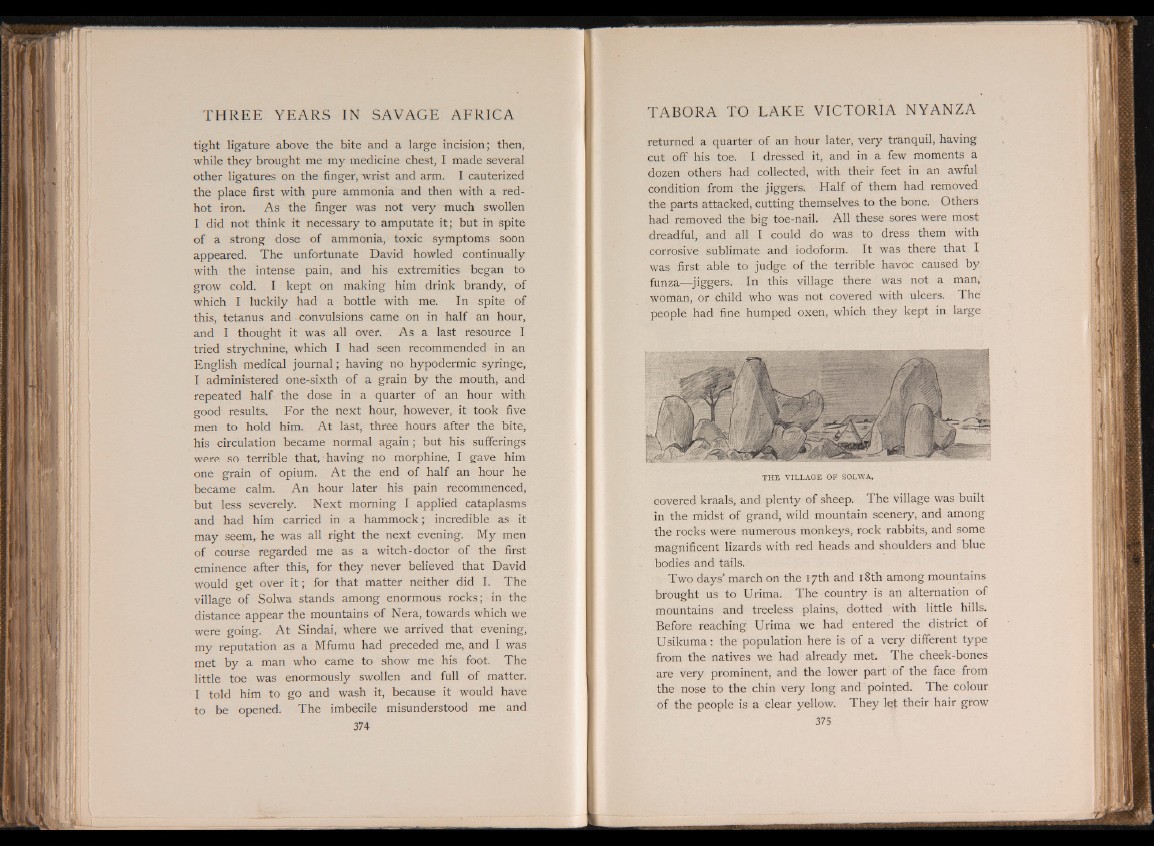
tight ligature above the bite and a large incision; then,
while they brought me my medicine chest, I made several
other ligatures on the finger, wrist and arm. I cauterized
the place first with pure ammonia and then with a red-
hot iron. As the finger was not very much swollen
I did not think it necessary to amputate it; but in spite
of a strong dose of ammonia, toxic symptoms soon
appeared. The unfortunate David howled continually
with the intense pain, and his extremities began to
grow cold. I kept on making him drink brandy, of
which I luckily had a bottle with me. In spite of
this, tetanus and convulsions came on in half an hour,
and I thought it was all over. As a last resource I
tried strychnine, which I had seen recommended in an
English medical journal; haying no hypodermic syringe,
I administered one-sixth of a grain by the mouth, and
repeated half the dose in a quarter of an hour with
good results. For the next hour, however, it took five
men to hold him. At last, three hours after the bite,
his circulation became normal again; but his sufferings
were so terrible that, having no morphine, I gave him
one grain of opium. At the end of half an hour he
became calm. An hour later his pain recommenced,
but less severely. Next morning I applied cataplasms
and had him carried in a hammock; incredible as it
may seem, he was all right the next evening. My men
of course regarded me as a witch-doctor of the first
eminence after this, for they never believed that David
would get over it; for that matter neither did I. The
village of Solwa stands among enormous rocks; in the
distance appear the mountains of Nera, towards which we
were going. At Sindai, where we arrived that evening,
my reputation as a Mfumu had preceded me, and I was
met by a man who came to show me his foot. The
little toe was enormously swollen and full of matter.
I told him to go and wash it, because it would have
to be opened. The imbecile misunderstood me and
374
returned a quarter of an hour later, very tranquil, having
cut off his toe. I dressed it, and in a few moments a
dozen others had collected, with their feet in an awful
condition from the jiggers. Half of them had removed
the parts attacked, cutting themselves to the bone, Others
had removed the big toe-nail, All these sores were most
dreadful, and all I could do was to dress them with
corrosive sublimate and iodoform. It was there that I
was first able to judge of the terrible havoc caused by
funza—jiggers. In this village there was not a man,
woman, or child who was not covered with ulcers. The
people had fine humped oxen, which they kept in large
covered kraals, and plenty of sheep. The village was built
in the midst of grand, wild mountain scenery, and among
the rocks were numerous monkeys, rock rabbits, and some
magnificent lizards with red heads and shoulders and blue
bodies and tails.
Two days’ march on the 17th and 18th among mountains
brought us to Urima. The country is an alternation of
mountains and treeless plains, dotted with little hills.
Before reaching Urima we had entered the district of
Usikuma: the population here is of a very different type
from the natives we had already met. The cheek-bones
are very prominent, and the lower part of the face from
the nose to the chin very long and pointed. The colour
of the people is a clear yellow. They let their hair grow
375